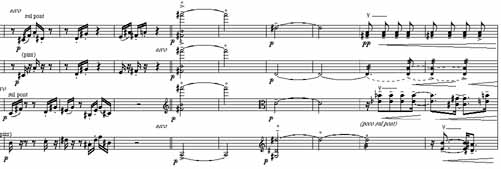Times Four: New
Music for Children

(fragment, Times Four
Quartet: for two violins, viola and cello— a piece
of medium difficulty
for 13 or 14 year olds)
Rethinking Music for Young People
For the past two years, I've been intensively involved in setting up and
creating
the content for a new music performance project, in part for young people.
Similar to the more philosophical work I have done in poetry, I feel that
it is impor-
tant to periodically pause and give serious attention to a number of the
more basic
problems with which we are confronted in the teaching of classical music
and,
most especially, new music performance practice.
Moving Beyond Arbitrarily Imposed Limits
Many things might be mentioned in this regard, but by way of introducing
the twelve
little piano pieces I've grouped together as a proposal to a number of
Suzuki teachers
with whom I'm currently working, let me call attention to just one:
One of the key features of the Western approach to any activity—whether
it be in science, or farming, or poetry or, indeed, music, is the highly
intellectual,
narrowly limited 'bandwidth' through which the world is seen and
experienced.
I don't wish to suggest so much the current computer metaphor in which there
is
a variable width of 'pipe' through which a variable amount of digital information
may be sent. Rather, I have in mind the striking image of one of those Hollywood
science fiction characters—usually androids of some kind—which,
instead of having
real human eyes, wears thin, dark sunglasses which are intended to give the
impression
of some kind of sophisticated computer vision.
I would like to suggest that, as far as our approach to teaching and learning
in the Arts
is concerned, we have as a culture become deeply conditioned to wearing,
as it were,
such 'limited bandwidth' glasses. What this means, and why I think the image
is ap-
propriate, is that, whenever we attempt to learn something new, say like
a poem or piece
of music, we do not do so with our whole being, but rather with some
fractional part
or aspect of ourselves. Indeed, it is as if our whole being were permanently
centered in
our eyes, and not, as would naturally be the case, centered in an infinitely
flexible way,
now in the hands, now in the feet, now in the top of the head, changing like
water in a
fast-flowing stream to meet every variation or new challenge presented by
the particular
context at hand. When we come to perform music through this limited bandwidth
approach, it can be easily recognized by the characteristic blank, lifeless
stare of our
faces. Indeed, we become something like the androids commercial cinema projects
so powerfully on the screen.
Seeing the World in a New Way
My contention is that this 'limited bandwidth' approach to the world is one
of the
primary blocks to to natural learning of any kind. This is especially the
case with
children, who must suffer many years of rigorous conditioning to learn to
sense
things this way.
I've often asked myself, "Why isn't it possible to simply take off the
glasses?"
Evidently, as with all habits, all we can hope to do is pause long enough
to suspend
the forward momentum of the pattern of behavior we are used to. In the silent
interval
thereby created, we can test—if only tentatively—how the world
looks without them.
| go to The Kids'
Circle: New Music
for Children | go to the string quartet featured above,
Times
Four |
| go to Cliff Crego's New Music website at cs-music.com
The Circle in the Square
| go to The Trillium
Collectio: Celtic
Trios |
| go to Picture/Poems:
Central Display
|
|
Map
|
TOC:
I-IV |
TOC:
V-VIII |
Index |
Text Only
| Download
Page |
Newsletter
|
About
P/P |
About Cliff
Crego |
Text © 2000 Cliff Crego Comments to
crego@picture-poems.com
(created V.21.2000)

